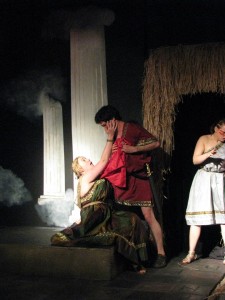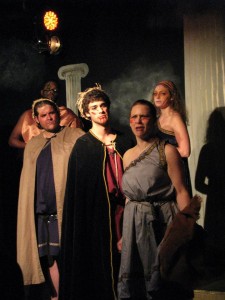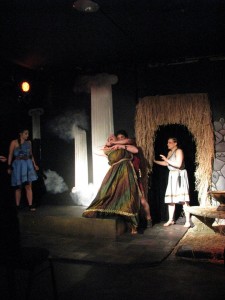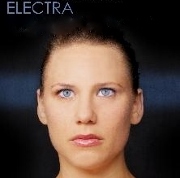STATIC ELECTRA
Your college classics teacher be damned: For all the talk about the Greek literary themes of hubris and arête, the Greek tragedies are just gussied up soap operas, with atrocity, lust, and rage being served up in heaping, blood-soaked portions. The fusty professors can ruminate all they want; these plays are about violent murder and  sinful behavior pure and simple, same as what you see on Housewives of Atlanta and Flowers in the Attic. Yet the old works of classical drama are sometimes so violent and full of disturbing undercurrents that new plays resembling Greek Tragedy would most likely not be crafted today: For starters, no “family friendly” producer would dare to produce a play in which two siblings kill their mother after she murders their father.
sinful behavior pure and simple, same as what you see on Housewives of Atlanta and Flowers in the Attic. Yet the old works of classical drama are sometimes so violent and full of disturbing undercurrents that new plays resembling Greek Tragedy would most likely not be crafted today: For starters, no “family friendly” producer would dare to produce a play in which two siblings kill their mother after she murders their father.
Electra represents the tit-for-tat of vengeance and rage that seemingly exists in the chromosomes of the Atreus family tree: The Kennedys have those chins, the Sheen family has gravelly voices, and the Atreuses kill each other – it’s how it works, one supposes. The adaptation of the Greek drama now playing at Archway is mostly derived from the version by Euripides, which takes place in the mid-point of the escalating sequence of family atrocities.
Before the start of Electra, the Greek hero Agamemnon had slaughtered his eldest daughter so as to create the wind that Greek soldiers needed to sail to Troy and the Trojan War. Also taking place before the play’s opening is Clytemnestra’s revenge: When Agamemnon returns home from the war, accompanied by his mistress, he is murdered in his bath by the embittered, faithless wife.
This is the point in which the Eurpides’ Electra (as adapted by Steven Sabel and JP Rapozo) begins. The brittle, power hungry Clytemnestra has taken up with a lover, who has forced Agamemnon’s daughter Electra to marry a filthy goatherd. The marriage is ordered partially out of spite and partially so that Electra’s offspring will be too base to threaten the royal family’s planned lineage. Electra, as one might  expect, is so consumed with hatred and rage, she can think of nothing else but killing her mother and stepfather. When Electra’s long-banished brother Orestes sneaks into town, the two siblings unite to take swords and butcher their mother and stepdad.
expect, is so consumed with hatred and rage, she can think of nothing else but killing her mother and stepfather. When Electra’s long-banished brother Orestes sneaks into town, the two siblings unite to take swords and butcher their mother and stepdad.
This production is staged as political revolution more than as a pendulum swing of atrocity followed by atrocity. Electra and Orestes are seething as much for being deprived of power as they are for daddy’s death. However, beyond this point, director Rapozo’s articulate but straightforward production offers few exceptional or even traditionally powerful elements to rationalize its purpose. The staging undeniably boasts a few nice touches: Orestes and Electra are assisted by their old nurse (Shayla Hudson), who, caparisoned in a shroud that covers her eyes, has a creepy ashy eeriness that allows her to steal every scene she’s in. Additionally, Claire Marie Mannle’s Clytemnestra possesses a steeliness of purpose and self-possessed certainty that will almost have you siding with her against the irrational, emotionally motivated Electra and Orestes.
Otherwise, the production’s lackluster execution and uneven performances never rise to the level of clarity and focused tragic angst the material requires. Part of the problem is that this translation lacks both emotional vigor and the underlying feeling of condensed realism. In spite of some tepidly enacted attempts to suggest this is a work of “savage ritual,” a sense of the mythic is missing.
As Electra, Tiffany Cole is perfectly enraged: Her sometimes twitchy nervous energy is reminiscent of Katee Sackhoff’s persona as Starbuck on Battlestar Galactica. However, her character always seems to be acting out of pique, not out of the mad sickness that drives her passions. Less enchanting is the undeniably photogenic but limp Travis Laughlin, who spends most of his time on stage looking  down at his chest plate as Orestes. In some respects, this shy-seeming performance makes sense—it anchors the notion that Orestes is weaker than his sister and is pushed by her to kill his mother. Still, both performers are disappointingly traditional and obvious; the show’s secondary tragedy is that it’s difficult to remember one moment of the pair’s turn a few hours after leaving the theater.
down at his chest plate as Orestes. In some respects, this shy-seeming performance makes sense—it anchors the notion that Orestes is weaker than his sister and is pushed by her to kill his mother. Still, both performers are disappointingly traditional and obvious; the show’s secondary tragedy is that it’s difficult to remember one moment of the pair’s turn a few hours after leaving the theater.
A number of the staging elements are flat out sloppy: The events are narrated and observed by a chorus of figures whom we gradually start to realize are meant to be gods. However, they just appear to be a mob of schlubby folks in magenta Astrobright chitons, (think Joanne’s fabrics hung with safety pins). Their sparkle-bedazzled eye make-up puts you in mind of an understudy cast for a high school production of Pippin, but even by that less-than-lofty standard some of the performers are noticeably stiff.
Here’s the thing. Plays – and particularly classical plays – really do need a reason to be presented, whether it’s an innovative concept, an enticing cast, or astounding production details. If there’s no bona fide raison d’être, the best a production can hope for is a sort of workmanlike competence. And that’s what this Electra achieves. It’s a pleasant, somewhat routine show that hits its marks and not much more.photos by Steven Sabel
Electra
Archway Theatre Company
Archway Studio Theatre, 305 South Hewitt St.
scheduled to end February 8, 2014
for tickets, call (213) 237-9933 or visit www.archwayla.com
